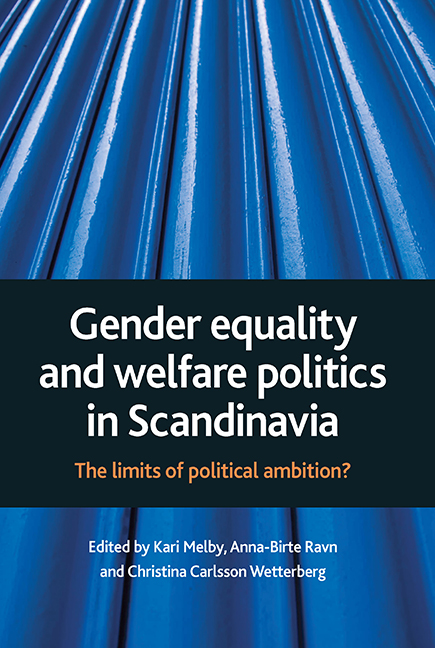Book contents
- Frontmatter
- Contents
- List of tables
- Preface
- Notes on contributors
- A Nordic model of gender equality? Introduction
- Part One Meanings of gender equality in Scandinavian welfare policy
- Part Two Current challenges: competing discourses on gender equality
- Postscript Gender, citizenship and social justice in the Nordic welfare states: a view from the outside
- Postscript Future research on gender equality in the Scandinavian countries
- Appendix Tables 1-10
- Index
six - The ‘new father’: gender equality as discursive resource for family policies
Published online by Cambridge University Press: 21 January 2022
- Frontmatter
- Contents
- List of tables
- Preface
- Notes on contributors
- A Nordic model of gender equality? Introduction
- Part One Meanings of gender equality in Scandinavian welfare policy
- Part Two Current challenges: competing discourses on gender equality
- Postscript Gender, citizenship and social justice in the Nordic welfare states: a view from the outside
- Postscript Future research on gender equality in the Scandinavian countries
- Appendix Tables 1-10
- Index
Summary
Introduction
The Norwegian Law on Children and Parents (hereafter the Children's Law) was passed in 1981. It replaced a body of laws from 1956 and introduced new ways of thinking about the family. Among other things, the law changed the parents’ rights to their children, revoking the mother's automatic right to the custody of young children after divorce. About 2000 the parents’ rights to their children were again discussed in the political decision-making bodies. Again the discussion sprang from a concern about parents’ rights. Did the Children's Law still incorrectly prioritise mothers’ rights over fathers’?
This chapter focuses on the discursive strategies applied in the political debates on this question. It explores what was a natural and plausible way of thinking about the child's interests and about the cooperation, responsibilities and sharing of rights between the parents at two different points in time. The data is sourced from parliamentary debates, political documents and committee reports about the introduction of the Children's Law and about some propositions and amendments to the law around 2000. Both in the 1980s and around 2000 the overriding rule for the development of family policies was that ‘the child's best interest’ must prevail. This concept was used to legitimise various suggestions, whether they concerned changes or amendments to the law, or arguments for retaining the status quo. In addition to an argumentation of the child's best interest, gender equality was the most-used semantic resource in the discussions on mothers’ and fathers’ rights after relationship break-ups. One of the main findings is that between 1980 and 2000 gender equality lost importance as a discursive resource for women and gained importance for men.
From presumption for the mother to equal rights with equal responsibilities
The automatic right of custody of young children to their mothers was removed when the Children's Law was introduced. The argument presented both by the Ministry and by MPs was that not only was giving preference to mothers over fathers not in the best interest of the child, it also violated the principle of equal rights for both parents. Custody and care of the child and parents’ responsibilities and rights should be determined by the public.
- Type
- Chapter
- Information
- Gender Equality and Welfare Politics in ScandinaviaThe Limits of Political Ambition?, pp. 119 - 134Publisher: Bristol University PressPrint publication year: 2008
- 2
- Cited by



